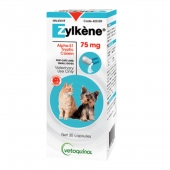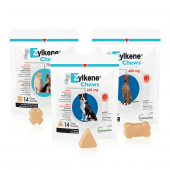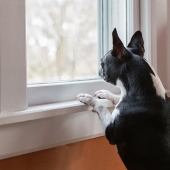Practice examining your pet at home
Each veterinary examination involves touching many of your pet’s sensitive or vulnerable areas, such as their eyes, ears, muzzle, paws and abdomen. Get them progressively used to this unfamiliar experience at home. When they remain calm, reward them with treats and praise to reinforce a positive association.
Get your pet comfortable with their carrier
Safe transportation of cats and small to medium-sized dogs requires a carrier. But if yours is typically stored away in the basement and only comes out right before veterinary appointments, your pet will quickly put two and two together. Instead, make their carrier a permanent part of your home. Keep the door open (or remove it entirely), add comfortable bedding and hide treats inside to make this small space cozy and appealing to your furry friend.
Leave early and drive smoothly
If you’ll be driving to the clinic, give yourself a good head start so you won’t feel compelled to rush or become frustrated at red lights. Be mindful of accelerating, steering and braking gently and keep the radio volume low to provide your pet with a peaceful ride. You want them to arrive at their destination as relaxed as possible.
Work around the busy waiting room
If your pet grows particularly nervous at the sights, smells and sounds of your clinic’s lobby—or reacts poorly to other animals—schedule their appointment during non-peak hours. Ask if you and your pet can wait outside the building’s entrance or inside your vehicle, and have someone call or text you when the team is ready.
Bring plenty of treats
Unless your pet needs to undergo a procedure on an empty stomach, bring treats to reward them at each new step, such as when entering the examination room, and for remaining calm and cooperative during the exam. Break treats into tiny pieces to make them last. If your pet refuses to eat, don’t force them: they’re likely too stressed to do so.
Keep calm and speak softly
Your pet can pick up on your anxiety. If you’re tense, agitated or raising your voice, your buddy will feel something’s wrong. Even during an emergency visit, make a conscious effort to speak slowly and softly. Reassure and praise your pet in a soothing voice to let them know everything is OK.
Ask your veterinarian about natural supplements
Despite implementing all the above tips, your pet may still make every clinic trip a terrible ordeal. Ask your veterinarian if giving your pet appropriate medication or a natural supplement before leaving home could reduce their anxious behaviour.
For example, Zylkene contains alpha-casozepine, an ingredient derived from a milk protein that may help cats and dogs face stressful situations such as travelling, veterinary appointments and professional grooming more calmly.





